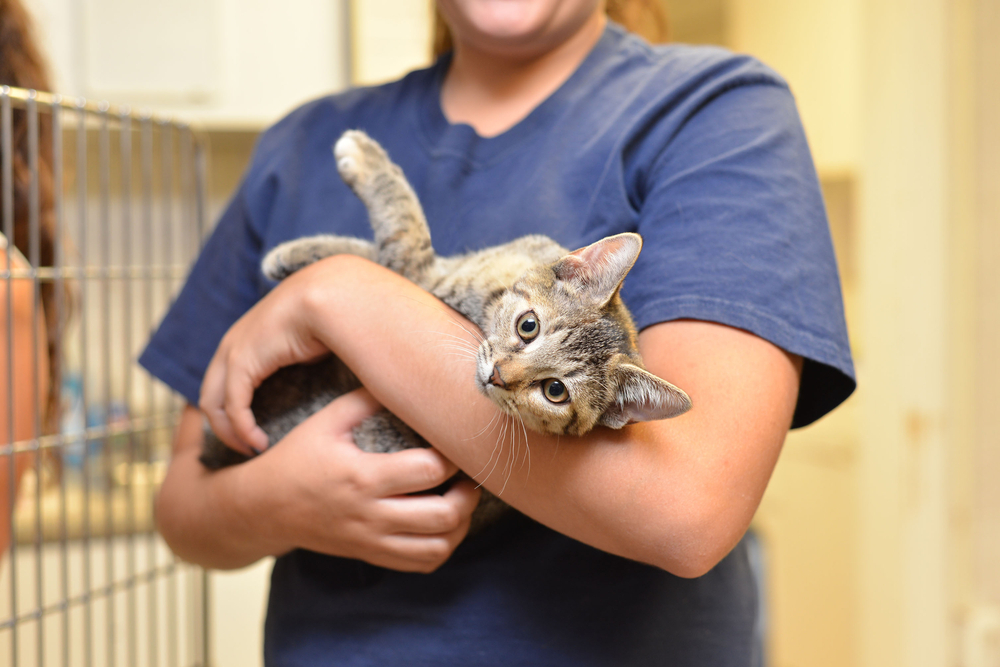Click to Skip Ahead
If you’re an animal lover, knowing the daunting statistics from animal shelters might break your heart. These poor kittens don’t ask to be born, and they really need humans who care. If you have been thinking about ways that you can contribute, you might have considered fostering.
Fostering can be a fabulous way to help out, especially if you can’t adopt directly or can’t quite commit to the long term care of a cat. In this article, we aim to give you more information about what to expect when you’re fostering from a rescue or shelter. Hopefully, we can help you decide whether fostering is correct for you.
The Importance of Fostering
Fostering is an incredibly important part of overall care. While kittens can be challenging and are a large time commitment, it’s also a very rewarding experience. Fostering is invaluable for kitten socialization, they learn to trust and play with humans and are more likely to be adopted into a loving forever home. Kittens are also more protected from infectious diseases in a foster home rather than a crowded shelter.
Unfortunately, fostering won’t be suitable for every person. Once you’ve learned a little bit more about what it entails, you can make a more informed decision about your ability to contribute.

The 9 Tips for Fostering Kittens
1. Educate Yourself
The best thing you can do before you decide to foster kittens is to educate yourself on the process thoroughly. You’re taking a pretty good step now as you read this article. It’s important to know exactly what you’re getting into to ensure you’re cut out for the task.
After all, you might have a huge heart for animals, but you don’t have the financial or the circumstantial means to care for them properly. And that’s OK! There are many other ways you can help out animals in need without taking on the responsibility of bringing them into your home.
2. Ensure Your Home Is Compatible
Speaking of, it is best to ensure your entire home is compatible with the new kittens. Whether you are fostering one or many, having a proper home setup is essential.
Do you have the space? Do you have a designated safe area where the kittens can be until they are sufficient enough to be in other areas of the home? Can you separate the kittens from potentially scary events in the home, such as a large dog or small children?
These are all extremely important aspects to consider, as you are bringing another life into the home that has potentially been through a bad situation already and can be extremely sensitive.

3. Have Enough Available Time
Fostering kittens, especially those requiring bottle feeding in a mother’s absence, can be extremely time-consuming. Often, full-time workers don’t have a schedule that permits them to care for these animals.
If you have an older kitten, it might not be quite as bad as they are pretty self-sufficient after several weeks of age. However, if you foster kittens, working 8+ hours a day with no one home is simply not going to cut the mustard.
4. Work Closely with Rescues and Shelters
Depending on who you’re working with, you should constantly have support from rescues and shelters. Always keep in contact with them, send them pictures and updates, and tell them about any questions or concerns you may have during the process.
They are there to help you, and you are helping them. This mutually beneficial relationship can create the best possible experience for the kittens in need.
5. Have the Proper Supplies
Often, shelters can supply the kittens with basics to a certain degree. But keep in mind that shelters have limited resources and are not always able to foot the bill for everything. When you take on fostering, you might be required to purchase food, supplies, litter, and other accommodations for the kittens.

6. Keep Up with Appointments
It is absolutely crucial to keep up with any appointments with the vet or animal shelter. Oftentimes, the animal shelters have in-house veterinarians who will deal with anything related to the kittens you foster.
They might want to see them weekly, biweekly, or just whenever a problem arises, depending on the age and delicacy of the situation.
7. Be Aware of Any Medical Issues
When kittens enter a shelter, they should be examined by a licensed veterinarian for signs of issues or illness.
When bringing the kitten into the home, it is important to understand any potential health issues associated so you can protect them and other animals in the home. Kittens might have certain infections, illnesses, and parasites that can be transmitted to the other pets in your home and come with extra care requirements.
8. Advocate for Your Fosters
It’s your job to spread the word. Sure, the rescue or shelter will ultimately decide what family can adopt the kittens. However, that doesn’t mean you can’t spread the word about the kittens you’re currently fostering on social media or otherwise.
After all, there’s no way to warm a person’s heart quicker than watching an adorable cat video or seeing pictures online. Word spreads fast, especially in today’s society, so make sure that you are advocating for these kittens in your care. You can also talk to potential adopters about the personalities of the kittens and their needs to make sure they are a good match.

9. Gather Up Your Resources Beforehand
Before you bring the kittens into your home, it is important to make sure you have all of the necessary supplies and the setup to keep them comfortable. You will need different supplies for every situation, as certain ones can be unique.
For example, if you are bottle-feeding kittens, you will need all of the necessary nipples, bottles, kitten formula, and other supplies to keep up with feedings. If kittens are very small, you might also need to stimulate them to use the bathroom, so having supplies on hand for that is crucial as well.
The shelter rescue you’re working with should be able to tell you exactly what you need and even potentially supply you with certain things to ensure the kittens are getting the best care possible.
Fostering to Adopt
You may have to come to terms with the possibility that you might fall in love with the kittens you foster. If you do, you might wonder if there is an option to adopt. Often, animal shelters will gladly work with foster parents to make sure they can adopt the kittens they’ve helped raise.
In fact, it’s often a very good scenario and one of the many outcomes that is hoped for. Regardless of whether or not you choose to adopt the cat you’re fostering, you can give them warm shelter, affection, and attention while they wait on their forever family.
Animal Shelter Statistics
For any animal lover, animal shelter statistics can be downright heartbreaking. Cats and dogs find themselves in this position all the time and many of them wind up in the same cycle again and again.
According to the ASPCA, there are an estimated 6.3 million companion animals that enter shelters every year. It’s almost divided down the middle with 3.1 million dogs and 3.2 million cats. Luckily, the number of dogs has decreased since 2011, but it still remains obscenely high.
Every year, almost 1,000,000 animals are euthanized, and the majority of them are cats. Luckily, this has decreased since 2011 by approximately 1.6 million.

Only 4.1 million surrendered shelter animals, including dogs and cats, are adopted. Sadly, only 810,000 animals that enter shelters as strays are returned to their owners, and only 100,000 of these are cats.
Luckily, the more people that advocate for pets in need, the more options we develop to care for animals without a loving family. Fostering is an incredible way to reduce these statistics even more and help prevent animal shelters from being overcrowded and overwhelmed.
Advocating for Animals in Need
If you’re an animal lover of any kind, it is so crucial that we advocate for the animals we love. Animals are without voices and require people who are willing to stand up against the issue to help protect and save lives.
If you cannot foster, you can do plenty of other things to help out. You can give donations, volunteer at shelters, share posts of available pets on Facebook, and a whirlwind of other options. Always contact your local shelter if you can help with your finances or time.
Conclusion
Fostering kittens is a huge step, but one that requires a lot of compassion and understanding. Suppose you’re a person who can’t stand another day of not doing something about the homeless animal population. In that case, you can be a very good candidate to foster, permitting that you have the time and right resources to care for the animal in your home.
If there’s one thing for sure, the kittens in your care will certainly appreciate you giving them a good start to a promising future.
Featured Image Credit: G Stock Studio, Shutterstock










